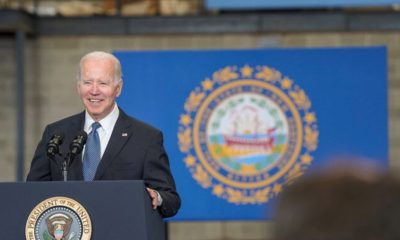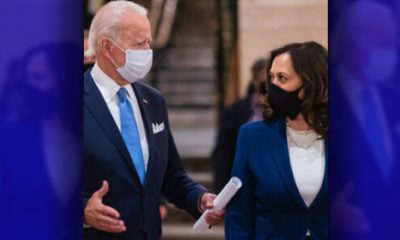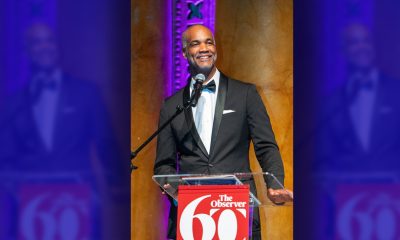Business
What Charter-Time Warner Cable Deal Could Mean for Consumers

This Feb. 2, 2009 file photo shows a Time Warner Cable truck in New York. Charter Communications is close to buying Time Warner Cable for about $55 billion, two people familiar with the negotiations said Monday, May 25, 2015. (AP Photo/Mark Lennihan, File)
TALI ARBEL, AP Business Writers
BREE FOWLER, AP Business Writers
NEW YORK (AP) — As the Internet has upended their business, cable companies have been racing to reinvent themselves as dominant broadband providers and distributors of online video.
Charter Communications’ $55 billion bid for Time Warner Cable, paired with a $10 billion side offer for Bright House Networks, marks the latest in a wave of deals that promise consumer benefits.
Perhaps so. Over the long run, though, critics say the collective weight of such deals may mean higher prices for subscribers.
In an accelerating trend, cable providers now have more Internet subscribers than TV subscribers, according to data provider SNL Kagan. As more viewers ditch TV for online video, competition for eyeballs is intensifying — from the likes of Netflix and Amazon to AOL to music-streaming service Spotify.
Here’s what that the Charter-TWC deal and others like it could mean over time:
Q: WHAT’S DRIVING THESE DEALS?
A: Cable companies are bulking up as costs for TV channels and sports rise even as the number of cable and satellite TV subscribers slips. The number of such subscribers declined around 500,000 over the 12 months that ended in March, according to data provider SNL Kagan.
Q: WILL REGULATORS LIKELY APPROVE THESE MERGERS?
A: It isn’t automatic. Earlier this year, Comcast Corp. dropped its own takeover bid for Time Warner Cable in the face of resistance from federal regulators. That proposed deal would have married the nation’s two biggest cable providers with a media powerhouse, Comcast’s NBCUniversal. Regulators worried that the combination would be too dominant in high-speed Internet service and might undermine the streaming-video industry that is changing TV viewing.
The Federal Communications Committee chairman, Tom Wheeler, upped the ante Tuesday, saying that “an absence of harm is not sufficient.” He said the FCC “will look to see how American consumers would benefit” from a Charter-TWC deal.
In its favor, Charter’s tie-up with TWC and Bright House isn’t as big as Comcast alone. And it doesn’t include a big entertainment company like NBCUniversal that could incentivize it to promote its own content.
Analysts expect the government to approve AT&T’s purchase of satellite TV company DirecTV, which does compete directly with the cable guys.
France’s Altice S.A., which was reportedly also interested in Time Warner Cable, last week bought a controlling stake in Suddenlink Communications. Altice declined to comment Tuesday.
Q: WOULD A CHARTER-TWC DEAL SERVE CONSUMERS?
A: Time Warner Cable has a terrible reputation for customer service. That could improve in the proposed merger. Charter said it’s been adding U.S. customer-service jobs and will continue to do so.
Charter also has simpler offers without a lot of hidden fees, said Jeff Wlodarczak, an analyst for Pivotal Research Group who says he think that the deal would be a net positive for consumers.
Charter argues that TWC customers would receive superior products — from faster broadband to expanded video offerings to additional high-definition channels. Charter says its slowest Internet speed — $40 a month for 60 megabits per second when bought by itself — is faster and cheaper than what Time Warner Cable offers. (Time Warner Cable advertises 30 megabits per second for $55 a month on its website.)
Charter says it would offer that option to Time Warner Cable customers, though prices could always change.
As a more national company, Charter could also compete better with phone companies that serve business customers, says Bruce Leichtman, a TV consultant and head of Leichtman Research Group.
Q: DO BIGGER CABLE COMPANIES MEAN HIGHER PRICES?
A: Internet prices have been rising and will likely keep doing so, said Forrester analyst James McQuivey. Still, he cautioned, it’s difficult to make any confident predictions at a time of rapid transformation in the industry and rising competition from online video.
“This is really a hard thing to say — because of x, y is going to happen, because there are about a dozen x’s in motion at the same time,” McQuivey said.
Some think differently. Cable companies already have scant competition for supplying Internet service, said Susan Crawford, co-director of the Berkman Center for Internet & Society at Harvard.
“High-speed Internet access today is a utility” that’s essential for education and job searching, Crawford noted. “Yet in American cities, cable is the dominant provider of that private utility and can charge whatever it wants to whoever it wants.”
For a provider, being big means you command better prices on TV and sports. That makes it harder for a new competitor like Google Fiber to offer attractive bundles of Internet and TV together.
Google Fiber exists in just three markets. In Kansas City, its presence made Time Warner Cable change its practices for the better, Crawford said.
Q: WHAT ABOUT CHEAP INTERNET TV?
A: Netflix and Hulu start at $8 a month. Amazon’s video library is part of its Prime shipping service, which costs $8.25 a month. HBO Now, which gives you HBO content without a cable subscription, is about $15 a month.
But as cable companies get bigger, they may make online video services pay more for access to their Internet customers. That could lead to higher prices.
By getting larger, cable companies can “control change in a more profitable manner,” said Nathan Miller, an economics professor at Georgetown University and formerly an economist with the Justice Department’s antitrust division. The risk, he said, is that companies can then charge more.
The FCC’s new Internet traffic rules, which broadband providers are suing to block, authorize it to investigate arrangements between Internet companies and broadband providers. That authority could help keep costs from rising substantially and being passed on to consumers.
Still, no one knows for sure how the industry’s transformation will affect prices.
“What any given deal means in terms of the ultimate price consumers pay — that’s a very difficult question to answer,” said Amanda Wait, a former Federal Trade Commission lawyer who represents clients in antitrust matters. “The analysis is more than just price. Do consumers have access to more content, higher broadband speeds? All those go into a consumer benefit analysis.”
Copyright 2015 The Associated Press. All rights reserved. This material may not be published, broadcast, rewritten or redistributed.
Activism
Oakland Post: Week of April 24 – 30, 2024
The printed Weekly Edition of the Oakland Post: Week of April 24 – 30, 2024

To enlarge your view of this issue, use the slider, magnifying glass icon or full page icon in the lower right corner of the browser window. ![]()
Bay Area
State Controller Malia Cohen Keynote Speaker at S.F. Wealth Conference
California State Controller Malia Cohen delivered the keynote speech to over 50 business women at the Black Wealth Brunch held on March 28 at the War Memorial and Performing Arts Center at 301 Van Ness Ave. in San Francisco. The Enterprising Women Networking SF Chapter of the American Business Women’s Association (ABWA) hosted the Green Room event to launch its platform designed to close the racial wealth gap in Black and Brown communities.

By Carla Thomas
California State Controller Malia Cohen delivered the keynote speech to over 50 business women at the Black Wealth Brunch held on March 28 at the War Memorial and Performing Arts Center at 301 Van Ness Ave. in San Francisco.
The Enterprising Women Networking SF Chapter of the American Business Women’s Association (ABWA) hosted the Green Room event to launch its platform designed to close the racial wealth gap in Black and Brown communities.
“Our goal is to educate Black and Brown families in the masses about financial wellness, wealth building, and how to protect and preserve wealth,” said ABWA San Francisco Chapter President LaRonda Smith.
ABWA’s mission is to bring together businesswomen of diverse occupations and provide opportunities for them to help themselves and others grow personally and professionally through leadership, education, networking support, and national recognition.
“This day is about recognizing influential women, hearing from an accomplished woman as our keynote speaker and allowing women to come together as powerful people,” said ABWA SF Chapter Vice President Velma Landers.
More than 60 attendees dined on the culinary delights of Chef Sharon Lee of The Spot catering, which included a full soul food brunch of skewered shrimp, chicken, blackened salmon, and mac and cheese.
Cohen discussed the many economic disparities women and people of color face. From pay equity to financial literacy, Cohen shared not only statistics, but was excited about a new solution in motion which entailed partnering with Californians for Financial Education.
“I want everyone to reach their full potential,” she said. “Just a few weeks ago in Sacramento, I partnered with an organization, Californians for Financial Education.
“We gathered 990 signatures and submitted it to the [California] Secretary of State to get an initiative on the ballot that guarantees personal finance courses for every public school kid in the state of California.
“Every California student deserves an equal opportunity to learn about filing taxes, interest rates, budgets, and understanding the impact of credit scores. The way we begin to do that is to teach it,” Cohen said.
By equipping students with information, Cohen hopes to close the financial wealth gap, and give everyone an opportunity to reach their full financial potential. “They have to first be equipped with the information and education is the key. Then all we need are opportunities to step into spaces and places of power.”
Cohen went on to share that in her own upbringing, she was not guided on financial principles that could jump start her finances. “Communities of color don’t have the same information and I don’t know about you, but I did not grow up listening to my parents discussing their assets, their investments, and diversifying their portfolio. This is the kind of nomenclature and language we are trying to introduce to our future generations so we can pivot from a life of poverty so we can pivot away and never return to poverty.”
Cohen urged audience members to pass the initiative on the November 2024 ballot.
“When we come together as women, uplift women, and support women, we all win. By networking and learning together, we can continue to build generational wealth,” said Landers. “Passing a powerful initiative will ensure the next generation of California students will be empowered to make more informed financial decisions, decisions that will last them a lifetime.”
Business
Black Business Summit Focuses on Equity, Access and Data
The California African American Chamber of Commerce hosted its second annual “State of the California African American Economy Summit,” with the aim of bolstering Black economic influence through education and fellowship. Held Jan. 24 to Jan. 25 at the Westin Los Angeles Airport Hotel, the convention brought together some of the most influential Black business leaders, policy makers and economic thinkers in the state. The discussions focused on a wide range of economic topics pertinent to California’s African American business community, including policy, government contracts, and equity, and more.

By Solomon O. Smith, California Black Media
The California African American Chamber of Commerce hosted its second annual “State of the California African American Economy Summit,” with the aim of bolstering Black economic influence through education and fellowship.
Held Jan. 24 to Jan. 25 at the Westin Los Angeles Airport Hotel, the convention brought together some of the most influential Black business leaders, policy makers and economic thinkers in the state. The discussions focused on a wide range of economic topics pertinent to California’s African American business community, including policy, government contracts, and equity, and more.
Toks Omishakin, Secretary of the California State Transportation Agency (CALSTA) was a guest at the event. He told attendees about his department’s efforts to increase access for Black business owners.
“One thing I’m taking away from this for sure is we’re going to have to do a better job of connecting through your chambers of all these opportunities of billions of dollars that are coming down the pike. I’m honestly disappointed that people don’t know, so we’ll do better,” said Omishakin.
Lueathel Seawood, the president of the African American Chamber of Commerce of San Joaquin County, expressed frustration with obtaining federal contracts for small businesses, and completing the process. She observed that once a small business was certified as DBE, a Disadvantaged Business Enterprises, there was little help getting to the next step.
Omishakin admitted there is more work to be done to help them complete the process and include them in upcoming projects. However, the high-speed rail system expansion by the California High-Speed Rail Authority has set a goal of 30% participation from small businesses — only 10 percent is set aside for DBE.
The importance of Diversity, Equity and Inclusion (DEI) in economics was reinforced during the “State of the California Economy” talk led by author and economist Julianne Malveaux, and Anthony Asadullah Samad, Executive Director of the Mervyn Dymally African American Political and Economic Institute (MDAAPEI) at California State University, Dominguez Hills.
Assaults on DEI disproportionately affect women of color and Black women, according to Malveaux. When asked what role the loss of DEI might serve in economics, she suggested a more sinister purpose.
“The genesis of all this is anti-blackness. So, your question about how this fits into the economy is economic exclusion, that essentially has been promoted as public policy,” said Malveaux.
The most anticipated speaker at the event was Janice Bryant Howroyd known affectionately to her peers as “JBH.” She is one of the first Black women to run and own a multi-billion-dollar company. Her company ActOne Group, is one of the largest, and most recognized, hiring, staffing and human resources firms in the world. She is the author of “Acting Up” and has a profile on Forbes.
Chairman of the board of directors of the California African American Chamber of Commerce, Timothy Alan Simon, a lawyer and the first Black Appointments Secretary in the Office of the Governor of California, moderated. They discussed the state of Black entrepreneurship in the country and Howroyd gave advice to other business owners.
“We look to inspire and educate,” said Howroyd. “Inspiration is great but when I’ve got people’s attention, I want to teach them something.”
-

 Community2 weeks ago
Community2 weeks agoFinancial Assistance Bill for Descendants of Enslaved Persons to Help Them Purchase, Own, or Maintain a Home
-

 Activism3 weeks ago
Activism3 weeks agoOakland Post: Week of April 3 – 6, 2024
-

 Business2 weeks ago
Business2 weeks agoV.P. Kamala Harris: Americans With Criminal Records Will Soon Be Eligible for SBA Loans
-

 Community2 weeks ago
Community2 weeks agoAG Bonta Says Oakland School Leaders Should Comply with State Laws to Avoid ‘Disparate Harm’ When Closing or Merging Schools
-

 Activism2 weeks ago
Activism2 weeks agoOakland Post: Week of April 10 – 16, 2024
-

 Community1 week ago
Community1 week agoOakland WNBA Player to be Inducted Into Hall of Fame
-

 Community1 week ago
Community1 week agoRichmond Nonprofit Helps Ex-Felons Get Back on Their Feet
-

 Community2 weeks ago
Community2 weeks agoThe Year Ahead: Assembly Speaker Rivas Discusses Priorities, Problems

























































